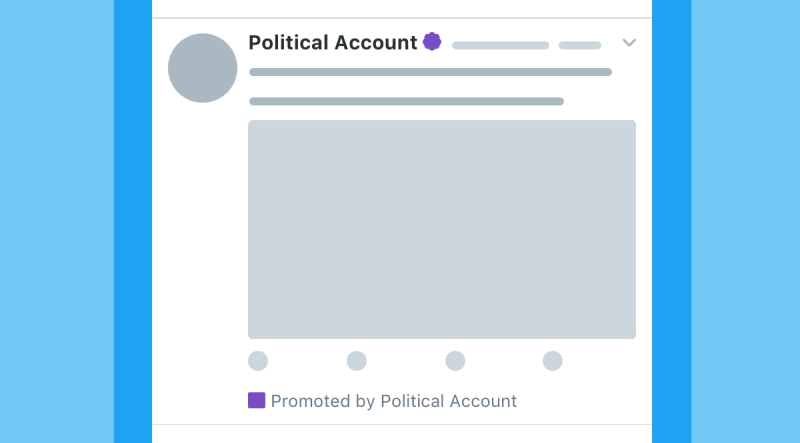
Twitter has announced steps to make all adverts on its platform more transparent, including those with a political or campaigning message, shedding light on so-called “dark ads”.
The micro-blogging platform said in a blog post that it will set up an Advertising Transparency Centre “in the coming weeks” that will “offer everyone visibility into who is advertising on Twitter” including details behind the adverts.
Political adverts, in particular those appearing during an election campaign, will be clearly marked as such and will have a different “look and feel” (pictured below), Twitter has said.

Through the transparency centre, users will be able to find out all political adverts currently running on the platform, how much has been spent on a campaign, who has funded it and which demographics have been targeted (age, gender etc.).
Users can also find out which adverts have been targeted to them specifically, as well as information on which adverts they are likely to receive based on targeting. They can then use tools to give feedback on adverts, including an “I don’t like this ad” option.
Twitter has also pledged to introduce stronger penalties for advertisers who violate its policies. The updates will be made first in the US before being rolled out globally.
Twitter has said it is committed stricter policies around “issue-based ads”, which Press Gazette understands are campaigns on social or moral issues, although the company siad there was currently “not clear industry definition” for this type of advert.
But, Twitter added: “We will work with our peer companies, other industry leaders, policy makers, and ad partners to clearly define them quickly and integrate them into the new approach…”
Twitter’s changes follows concerns over so-called “dark ads” aimed at a specific set of users on social media that go unseen by those not targeted, making scrutiny by external bodies virtually impossible.
Will Moy, director of fact-checking organisation Full Fact, told Press Gazette ahead of this year’s general election that dark ads were a greater concern than the spread of fake news on social media.
He said the problem with “highly targeted advertising” was that “we don’t know if campaigns are saying the same thing to people or if they are saying different things”.
“It’s possible they are running adverts that aren’t true and there is no way of seeing the advert unless you have been targeted,” he added. “If you aren’t targeted by them you don’t even know they exist so you can’t even fact check them.”
Facebook founder and chief executive Mark Zuckerburg announced last month that the social media giant would make it possible for users to see all of the adverts being run on Facebook by an advertiser.
The action seems to have been prompted by fears of Russian influence in last year’s US presidential election which Facebook is working with the US government to investigate, according to Zuckerberg.
Moy has called for the UK to update legislation forcing organisations behind adverts to be identified so that it also applies online. He said: “Protections like these should be scrutinised by MPs and written in law, not in the terms and conditions of the internet platforms.”
Picture: Twitter/PA Wire
Email pged@pressgazette.co.uk to point out mistakes, provide story tips or send in a letter for publication on our "Letters Page" blog
